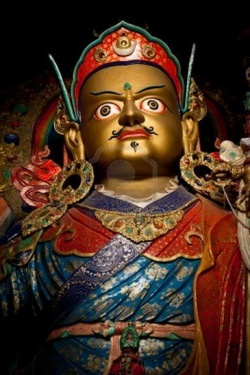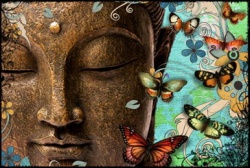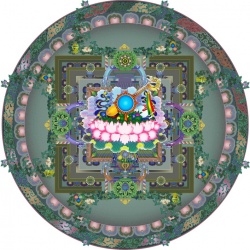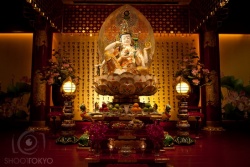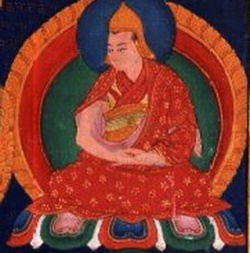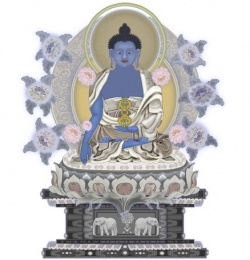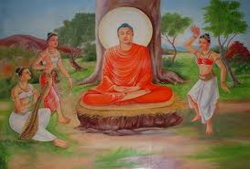The Lion's Roar
After hearing the Buddha, many decided to give up the wrong views they previously held regarding their religious way of life.
Buddhism is a beautiful gem of many facets, attracting people of diverse personalities. Every facet in this gem has tested methods and approaches that can benefit the Truth seekers with their various levels of understanding and spiritual maturity.
The Buddha Dhamma is the fruit resulting from a most intensive search conducted over a long period of time by a compassionate noble prince whose mission was to help suffering humanity. Despite being surrounded by all the wealth and luxuries normally showered on a crown prince, He renounced His luxurious life and voluntarily embarked on a tough journey to seek the Truth and to find a panacea to cure the sickness of the worldly life with its attendant suffering and unsatisfactoriness. He
was bent on finding a solution to alleviate all suffering. In His long search, the prince did not rely on or resort to divine guidance or traditional beliefs as was fashionable in the past. He did an intensive search with a free and open mind, guided solely by His sincerity of purpose, noble resolution, inexhaustible patience, and a truly compassionate heart with the ardent wish to relieve suffering. After six long years of intensive experiment, of trial and error, the noble prince achieved His aim --- He gained Enlightenment and gave the world His pristine teachings known as Dhamma or Buddhism.
The Buddha once said, 'Monks, the lion, king of beasts, at eventide comes forth from his lair. He stretches himself. Having done so, he surveys the four quarters in all directions. Have done that, he utters thrice his lion's roar. Having thrice uttered his lion's roar, he sallies forth in search of prey.
'Now, monks, whatever animals hear the sound of the roaring of the lion, king of beasts, for the most part, they are afraid; they fall to quaking and trembling. Those that dwell in holes seek them; water-dwellers make for the water; forest-dwellers enter the forest; birds mount into the air.
'Then whatsoever ruler's elephants in village, town or palace are tethered with stout leather bonds, they burst out and rend those bonds asunder; void their excrements and in panic run to and fro. Thus potent, is the lion, king of beasts, over animals. Of such mighty power and majesty is he.
'Just so, monks, is it when a Buddha arises in the world, an Arahant, a Perfectly Enlightened One, perfect in wisdom and in conduct, wayfarer, Knower of the worlds, the unsurpassed trainer of those who can be trained, teacher of gods and men, a Buddha, an Exalted One. He teaches the Dhamma; "Such is the nature of concept of Self; this is the way leading to the ending of such a Self.'
'Whatsoever gods there be, they too, on hearing the Dhamma of the Tathagata, for the most part are afraid: they fall to quaking and trembling, saying: 'We who thought ourselves permanent are after all impermanent: that we who thought ourselves stable are after all unstable: not to last, though lasting we thought ourselves. So it seems that we are impermanent, unstable, not to last, compassed about with a Self.' Thus potent is a Tathagata over the world of gods and men. (Anguttara Nikaya).
When you begin to experience the process of going towards emotions, rather than emotions coming towards you, then you begin to make a journey. A sense of dance begins to evolve. The lion's roar is depicted by lions looking in the four directions. Our fearlessness is all-pervading, radiating in all directions. Enlightened experience is not exclusively for pacifists. Enlightened experience also means relating with energy, waves and waves of energy. As long as we try to patch over what we feel are unworkable situations with metaphysical, philosophical or neat religious ideas, then the lion's roar turns into a coward's scream, which is very pathetic.
The lion's roar, according to Chögyam Trungpa Rinpoche, is the fearless proclamation that whatever comes up in our state of mind, including powerful emotions, is workable. (F Lion's Roar * 12/12)
Having problems come up is a way of destroying our credentials as well as our comfort and security. Then we can begin relating with the emotions and accepting our life situation, accepting all the chaos that happens. So the chaos, and relating to the chaos, should be regarded as "good news, extremely good news, utterly good news." Enlightened experience is not exclusively for pacifists. Enlightened experience also means relating with energy, how to handle this eruption of tremendous energy, waves and waves of energy.
In the third turning of the wheel of dharma, the Buddha speaks of the lion's roar. The lion's roar is the fearless proclamation that anything that happens in our state of mind, including emotions, is manure. Whatever comes up is a workable situation; it is a reminder of practice, and it acts as a speedometer. It is a way to proceed further into the practice of meditation.
In this way we begin to realize that all kinds of chaotic situations that might occur in life are opportune situations. They are workable situations that we mustn't reject, and mustn't regard as purely a regression or going back to confusion at all. Instead, we must develop some kind of respect for those situations that happen in our state of mind.
There are several stages in relating with energy and emotions. There is seeing, hearing, smelling, touching and transmuting.
Seeing refers to a general awareness that emotion has its own space, its own development, so that at least you accept it as part of the pattern-without question, without reference back to the scriptures or whatever. Without the help of credentials, we experience directly that those things are happening.
Then hearing is the experience of the pulsation of such energy, of the energy upsurge comlng towards you.
Smelling is the experience that energy is somewhat workable-the way you smell food, and that smell becomes the appetizer before you eat. It smells like a good meal, smells delicious, although you haven't yet eaten it. And somehow that makes the whole thing more workable.
Then touching is feeling the nitty-gritty of the emotional energy. You can touch it, relate with it, and realize that, after all, emotions are not particularly either destructive or creative. Rather, they are just a self-existing situation, just upsurges of energy-whatever particular forms they might take: aggression or passion or depression.
Finally there is transmutation. This does not mean rejecting the basic qualities of emotions, but it is like the alchemical practice of changing lead into gold. Basically, in that practice you don't reject the metallic qualities, but you change the appearance and substance somewhat. Similarly, you can experience emotional upheaval as it is, but still work with it, become one with it.
The usual problem we have when emotions arise is that we feel we are being challenged by them. We think that emotions will take over our self-existence, our credential of existence. We are afraid that, if we become the embodiment of hatred or passion, then we won't have any personal credentials anymore.
So usually we react against emotion, because we feel we might be taken over by it. We feel there is a strong possibility that we might freak out, lose our heads. We are afraid that aggression or depression will become so overwhelming that we will begin to lose our general functional level, forget how to brush our teeth, how to take a shit in the toilet or whatever. There's some kind of fear that the whole thing might become too much, so that we might get hooked into it. Then we will lose our dignity, our ability to function as ordinary human beings like the others. That seems to be the problem.
So transmutation in this case means going through such fear or whatever else might be, or occur. Let yourself be nuts. Go through it, give into it, experience it. And when you begin to experience this process of going towards emotions rather than emotions coming towards you, then you begin to make a journey. You are making an effort towards them, therefore some actual relationship is involved, and a sense of dance begins to evolve.
This means that the highest forces of energy, any kind of extraordinary energies there might be, become absolutely workable rather than taking you over. This is because, if you are not offering any resistance, there's nothing to take over. Whenever there's no resistance, there is a sense of rhythm happening. The music and dance happen at the same time.
So that is what is called the lion's roar: whatever occurs in the realm of samsaric mind is regarded as the path, and everything is workable. It is a fearless proclamation-lion's roar.
But as long as we patch over what we feel are unworkable situations, as long as we try to put the patchwork of metaphysical, philosophical or neat religious ideas over the holes, then it ceases to be a lion's roar. It turns instead into a coward's scream-which is very pathetic.
That is usually what happens. Whenever we feel that we can't work on something, automatically we jump; we look back and try to find some kind of resources for ourselves. And we use all kinds of euphemisms: we ask, "What's the medicine for this?"-which is a euphemism for patchwork. We are trying to conceal the hole. "How could we save face and avoid being embarrassed and challenged by our emotions? How could we get out of this?" Maybe we can avoid the whole thing by putting patchwork on top of patchwork. We can load ourselves with millions of patchworks all on top of each other. If the first one is too delicate, the second may be more powerful.
So we end up creating a suit of armor-but even that has some discrepancies. The joints in our suit of armor begin to squeak; there are some holes in there. And it is difficult to relate with that. We don't quite want to put patches on the joints. Although we don't want to squeak, we want to be able to move, we still want to dance-we still want to have joints.
So unless we are completely mummified, which is death, being a corpse, there's no way to have perfect patchwork. For a living human being, patchwork is an absolutely impractical idea. From this point of view, buddhadharma without credentials is equal to the lion's roar. It proclaims that we do not need patches anymore. We could transmute the substance, the feeling in its own existence, which is extremely powerful. In the Indian Ashokan artwork, the proclamation of lion's roar was depicted by a sculpture of four lions looking in the four directions, which symbolizes that you don't have a back. Every direction is a front; there is all-pervading awareness. And this symbol was adopted by modern Indians as their state emblem. So fearlessness comes from facing all directions. We don't have to take one direction; once we begin to radiate our fearlessness, it is all pervading, radiating in all directions. In iconographical tradition, certain buddhas are represented as having a thousand faces, or a million faces, looking in all directions. That symbolizes panoramic awareness-looking everywhere, so there is nothing to defend.
The lion's roar is analogous to space: space is constantly self-existing center as well as fringe. Wherever there's space, there's center as well as fringe. So space is all pervading and self-contained. Similarly, the idea of lion's roar is fearlessness in the sense that every situation that comes up in our life is workable. Nothing is rejected as a bad influence or grasped as a good influence. Everything that goes on in our life situation, all the types of emotion, is workable. The inherent essence of situations is workable, and the apparent qualities of situations are workable as well.
From that point of view we can see quite clearly that trying to apply a reference point of credentials is useless. We have to really work with the situation completely and thoroughly. It is like being extremely interested in food, in eating food. There's no time to read the menu because we simply want to eat. We really want to relate with the food, so we forget about the menu. It's our immediate interest. It's a direct relationship of some kind.
That seems to be the basic point of the lion's roar. In other words, if we are able to deal directly with the emotions arising in our life situation, and relate with them as a workable situation, then the whole thing becomes a situation that doesn't need any further maintenance. It is a self-maintained situation, and any help from outsiders becomes credentials.
So we develop our self-existing help within that. At that point, as I mentioned already, we don't have to really avoid the credential problem any more, because there's no room for speculating or validating. Everything becomes obvious and immediate and workable. There's not even the chance or time or space to speculate on how to become a charlatan or how to con other people, because the situation is so immediate. The idea of charlatanism doesn't appear at all, because there's no room for the idea of gain.
Question: Is this true of any emotion, that you just deal with it by getting directly into it?
Trungpa Rinpoche: If you really get into it, which doesn't mean to say that you have to kill somebody or suppress it, but just get the texture of its own nature, yes.
That sounds too simple.
It is simple, that's why it's workable. This doesn't need special training, just use basic instinct.
It seems that in certain emotional states, part of the state itself is a kind of paralysis; you are unable to respond, you're actually stuck in that place. Do you mean that at that point there must be an extra effort of conscious attention to that?
Well, when you get stuck, it is a beautiful situation. You have more chance to relate with the textures. Let it be that way, rather than trying to get unstuck.
What about depression? All the things you are talking about seem to be energies, emotions of energies, but a state of depression seems to be a negative energy, or absence of energy.
Depression is one of the very powerful energies, one of the most common energies that we have. It is energy. Depression is like an oxygen tank which wants to burst, but is still bottled. It is a fantastic bank of energies, much more so than aggression and passion which are kind of developed and then let out. They are in some sense frivolous, whereas depression is the most dignified energy of all.
I'm not quite satisfied. You say it's a bank of energy. How do you take the money out of the bank or does it just stay in the vault?
Well, try to relate to the texture of the energy in the depression situation. Depression is not just a blank, it has all kinds of intelligent things happening within it. I mean, basically depression is extraordinarily interesting and a highly intelligent state of being. That is why you are depressed. Depression is an unsatisfied state of mind in which you feel that you have no outlet. So work with the dissatisfaction of that depression. Whatever is in it is extraordinarily powerful. It has all kinds of answers in it, but the answers are hidden. So, in fact I think depression is one of the most powerful of all energies. It is extraordinarily awake energy, although you might feel sleepy.
Is that because it wipes everything away? Could it be a kind of emptiness, a sort of doorway to meditation. I mean, in that kind of depression there is the feeling that nothlng is happening at all.
Well, that's it. That's quite a profound thing. It has its own textures. Let's say that you feel extraordinarily depressed, and there is no point in doing anything. You seem to be doing the same thing all over again. You give up the whole thing but you can't. And on the whole, you are extremely depressed and trying to do something is repetitious. And trying not to do something is also irritating. Why should you do something? The whole thing is absolutely meaningless. You feel extremely down. Trying to get into the things that used to inspire you makes more depression, because you used to get off on them and you can't anymore. That's very depressing and everything is really ordinary, extremely ordinary and really real, and you don't really want to do anything with it. It's an extraordinarily heavy weight pushing down. You begin to experience that your ceilings are much heavier than they used to be, and the floor becomes much heavier than it used to be. There is a whole wall made out of lead, compressing you all over the place; there is no outlet at all. Even the air you breathe is metallic, or lead, or very thick. There is no freshness at all. Everything that depression brings is really, really real and very heavy. And you can't really get out of it because the idea of getting out of it itself brings further depression, so you are constantly bottled and pushed in that situation and you would like to just purely sit around.
Well, if the whole thing gets worse, then just trying to step out, which seems to be the only answer, is a suicidal approach. Things get very heavy and very slow. Meeting inspiring friends, who used to be inspiring friends, becomes depressing. When you try to put on a record of the music that used to inspire you, it also brings depression. Still nothing ever moves. The whole thing is black, absolute black.
But, at the same time, you are experiencing tremendous texture, the texture of how the stagnation of samsara works, which is fantastic. You feel the texture of something. That entertainment didn't work. This entertainment didn't work. Referring back to the past didn't work; projecting into the future didn't work. Everything is made out of texture, so you could experience depression in a very intelligent way. You could relate with it completely, fully. And once you begin to relate with it as texture of some kind, as a real and solid situation which contains tremendous texture, tremendous smell, then depression becomes a beautiful walkway. We can't discuss it really. We have to actually get into heavy depression and then feel about that.
Unite with the depression.
Yeah, you become the depression.
What about extreme physical panic or discomfort, the nausea, the headache, thinking you're going to pass right out, and sometimes the sweat, the cold sweat, the shortness of breath where you can't catch your breath.
It seems to be psychosomatic. According to the Buddhist way of viewing physical health, any sickness that comes up is a hundred per cent, if not two hundred, psychosomatic. Always.
So you just keep going back to that point?
Yeah, back to mind, back to the heart. There is a Zen writing called "Trust in the Heart." You should read that.
So what you're saying is that everything that I experience and everything that I think as "I-experience" is really buddhamind, experiencing itself?
Yeah, without fear. That's the lion's roar. That is lion's roar.
When you are doing sitting meditation, do you bring the emotions that arise in everyday life to your sitting, or is it simply enough to go back to your breath?
Well, as far as the sitting practice is concerned, emotions are thinking, pure thinking. In our everyday life situations, emotions are a challenge, possibilities of path.
So it would seem that the only time an emotion could harm you is if you try to repress it, if you try to push it back.
As well as if you try to analyze it fully, or act it out in a frivolous way.
What do you mean by frivolous?
Well, go out and kill somebody. You know that.
It seems like emotions take on a quality of coming towards you, so you have to figure them out, analyze them.
I don't see problems with that. It's a question of whenever there is doubt, you find out the root of the doubt, and find out where the doubt came from, not particularly in order to solve the problem as such, but just to relate with the face value of things happening on the spot. That's what is called, in Buddhist terms, scientific mind. It is experiencing, analyzing on the spot without value judgment. So from that you begin to learn with tremendous directness, the simple facts of the matter, and you go on from that. You don't have to be goal oriented particularly. And scientific mind is not particularly goal oriented. True scientists are unconcerned with the goal. They are fascinated by finding out the facts of the matter.
I don't quite know what you mean by experiencing emotions in meditation as thoughts. A powerful physical sensation might go along with an emotion. I don't know what you mean by experiencing it as a thought.
An emotion is also a thought. You're enraged with anger, as if you are almost going to levitate on your meditation cushion. And it's still your thought, so you say "a thought," "thought;" you say "thinking," "thinking," "thinking."
Are you saying that there is actually no feeling without thinking?
Well, you see the thing is, the fifth skandha of consciousness, of thinking, plays the leading part, the introductory one. This goes back to the conceptual, the feeling and everything. So the fifth skandha plays an important part, always. The fifth skandha is always the leading point.
I know the point is not to get rid of your depression or anger, but do they wear out, like distractions?
No promise, my dear. Wait and see. Have more patience.
Adapted from the seminar Buddhadharma Without Credentials, held at the New York Dharmadhatu in March, 1973. ©1997 Diana J. Mukpo

